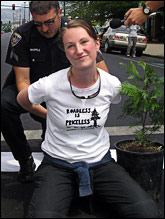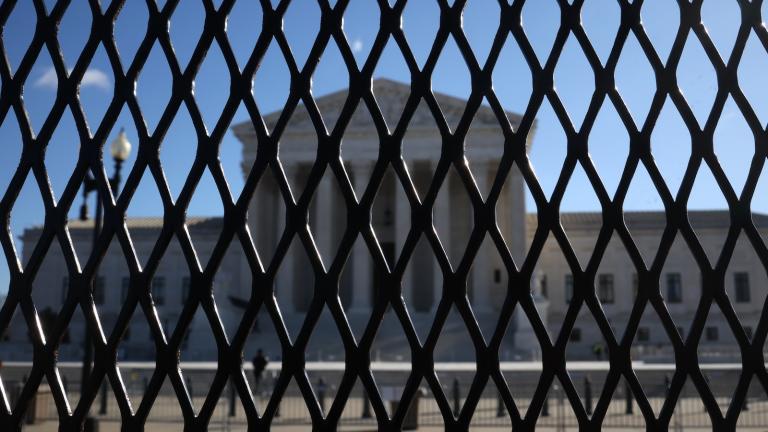 Today I received an email from my friend Kate, with whom I studied environmental politics and geology in college, and who now works for the Cascadia Wildlands Project in Eugene, Oregon. On Monday, she was arrested in Medford, Oregon, during a protest against the roadless-area logging recently approved by the Bush Administration. Below the fold is her letter describing her experience and explaining why she chose to participate in an act of civil disobedience. I’ve added links to relevant bits of background.
Today I received an email from my friend Kate, with whom I studied environmental politics and geology in college, and who now works for the Cascadia Wildlands Project in Eugene, Oregon. On Monday, she was arrested in Medford, Oregon, during a protest against the roadless-area logging recently approved by the Bush Administration. Below the fold is her letter describing her experience and explaining why she chose to participate in an act of civil disobedience. I’ve added links to relevant bits of background.
“Civil disobedience becomes a sacred duty when the State becomes lawless or, which is the same thing, corrupt.” –Mahatma Gandhi
Dear friends, family, and loved ones,
On Monday, August 7 I was arrested for protesting logging in the largest wild, undeveloped forest on the west coast. I would like to explain what compelled such drastic action and share some reflections from my 24 hours in jail.
In 2001, the Roadless Area Conservation Rule set aside 59 million acres of the most pristine forests in our country. These public lands, lands owned by every American, were to be protected for recreation values, wildlife habitat, and future generations. Roadless areas represent our natural heritage, with towering forests and wild rivers that support unique and cherished wildlife. Over two million Americans wrote letters in support of the roadless policy, more than any other policy in history.
Late last year, the Bush administration overturned the rule and replaced it with a weaker one that allows state governors to petition for roadless forest protection in their states. Oregon, Washington, California, and New Mexico sued the federal government for the repeal and their disregard of public opinion. The Bush administration guaranteed protection for roadless areas until governors completed their petitions, but quickly dropped this promise and announced two clearcutting projects in southern Oregon roadless areas. Our governor wrote a letter to the administration demanding that they keep their promise, but the administration looked the other way and continued with their plans. This is blatant disrespect for our state’s rights. This also sets a precedent for logging roadless forests across the country.
In June, the federal government auctioned off these majestic old-growth forests to the timber industry for less than the price of firewood. Even the conservative Oregonian newspaper called these logging projects “a total waste of time, money and public trust in the Forest Service [. . .] This sale makes no economic or environmental sense. It is only the Bush administration forcing its way into a roadless Oregon forest, just to prove that it can” (June 10).
As an American, I am outraged at the deceit and corruption represented in these clearcutting projects. As a native of the Pacific Northwest, I am devastated to see our legacy forests fall for the sake of a quick profit.
For two years, I have worked to renew protection for these wild forests. I have organized communities, called elected officials, worked with the media, written letters to the editor, and more. Alas, none of this could stop the greed of a few wealthy, powerful individuals. I decided to take things a step further.
On Monday, logging began in a roadless area for the first time in over a decade. I joined over 100 protestors in southern Oregon to demonstrate opposition to the destruction of an American legacy. I also joined 11 others in an act of civil disobedience.
In his Letter from Birmingham Jail, Dr. Martin Luther King, Jr. wrote, “As in so many past experiences, our hopes bad been blasted, and the shadow of deep disappointment settled upon us. We had no alternative except to prepare for direct action, whereby we would present our very bodies as a means of laying our case before the conscience of the local and the national community.”
Seeking to draw media attention and raise public awareness on the values of roadless areas and the precedent being set, we formed a peaceful blockade in front of the Siskiyou National Forest office. We then sat down in Medford’s main street with potted trees and a banner that read “Roadless is Priceless.” The police quickly moved in and arrested us, charging us with disorderly conduct. Our arrest made national press. I was featured being interviewed and cuffed on southern Oregon’s three TV stations.
Jail is hardly a vacation. After being in a holding cell with my fellow female protestors for four hours, we had to strip and change into jail clothes (which, despite being hideous, are surprisingly comfortable). Along with two other women from our group, I was assigned a jail cell that already held four other women (mostly there on drug-related charges). The women were surprisingly welcoming, friendly, and supportive of our cause.
The cell was cold, bright with fluorescent lights, and rank with despair. Dinner looked and smelled worse than dog food. Most of the cops were respectful, but some were cruel. They yelled, told us we had no rights, made condescending remarks. One “perk”: our cell had cable TV. I never imagined I’d spend a night in jail watching the Princess Bride.
Sleep was slow to come that night, but when it did my dreams were vivid and frightening. At 4 am, two officers hauled the girl in the bunk below me off to prison. She was pregnant and battered by her boyfriend.
Being locked away is a strange and disgruntling experience, but it allowed me time to reflect on the current predicaments of our society. Henry David Thoreau wrote, in his essay On the Duty of Civil Disobedience, “Must the citizen ever for a moment, or in the least degree, resign his conscience to the legislator? Why has every man a conscience, then? I think that we should be men first, and subjects afterward. It is not desirable to cultivate a respect for the law, so much as for the right.”
As I gazed at the concrete walls around me, I thought back on other great social leaders of the past … Martin Luther King, Jr., Gandhi, Rosa Parks… people who affected massive social change by rejecting the status quo and using civil disobedience and nonviolent resistance to relay their message for change. Rosa Parks, referring to her refusal to give up her bus seat, said “at the time I was arrested I had no idea it would turn into this … It was just a day like any other day. The only thing that made it significant was that the masses of people joined in.”
I do not advocate anything radical, only moral. Our government has deceived us. It is abusing its power within our country and around the world. What is happening right now in southern Oregon is a manifestation of the corruption and destructiveness of this administration. They aggressively promote clearcutting forests, polluting rivers, killing wildlife, lowering fuel efficiency and emission standards, modifying crop genetics, drilling in refuges, and much more. It is an outrage. Again I quote Thoreau: “How does it become a man to behave toward this American government today? I answer, that he cannot without disgrace be associated with it.”
I refer back to MLK’s Birmingham letter: “You may well ask: ‘Why direct action? Why sit-ins, marches and so forth? Isn’t negotiation a better path?’ You are quite right in calling for negotiation. Indeed, this is the very purpose of direct action. Nonviolent direct action seeks to create such a crisis and foster such a tension that a community which has constantly refused to negotiate is forced to confront the issue. It seeks so to dramatize the issue that it can no longer be ignored … The purpose of our direct-action program is to create a situation so crisis-packed that it will inevitably open the door to negotiation.”
I will continue to use every means I know to protect our forests, rivers, and wildlife. I am fortunate to know so many talented and compassionate people who will work alongside me. The community response I have received from this week’s events have been uplifting and inspiring.
In a quiet, scratchy voice, the 80-year-old man sitting with us in the blockade he shared a story of Henry David Thoreau: After Thoreau was arrested for civil disobedience and protesting unjust taxes, his friend Ralph Waldo Emerson came to visit him in jail. Emerson asked, “Henry, what are you doing in there?” Thoreau replied, “Why, Ralph, what are you doing out there?”
I would be happy to share more or answer any questions you have. Thank you for your love and support.
With love,
Kate
 Today I received an email from my friend Kate, with whom I studied environmental politics and geology in college, and who now works for the
Today I received an email from my friend Kate, with whom I studied environmental politics and geology in college, and who now works for the 

